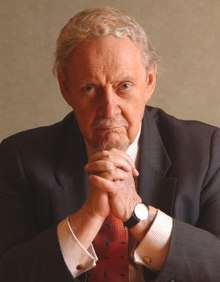
Robert Heron Bork (March 1, 1927 – December 19, 2012) was an American judge, government official, and legal scholar who advocated the judicial philosophy of originalism. He served as a Yale Law School professor, the United States Solicitor General, the Acting United States Attorney General, and as a judge of the United States Court of Appeals for the District of Columbia Circuit. In 1987, President Ronald Reagan nominated him to the Supreme Court, but the United States Senate rejected his nomination. Bork had more success as an antitrust scholar, where his once-idiosyncratic view that antitrust law should focus on maximizing consumer welfare has come to dominate American legal thinking on the subject.
Quotes
- By 1954, when Brown came up for decision, it had been apparent for some time that segregation rarely if ever produced equality. Quite aside from any question of psychology, the physical facilities provided for blacks were not as good as those provided for whites. That had been demonstrated in a long series of cases . . . The Court's realistic choice, therefore, was either to abandon the quest for equality by allowing segregation or to forbid segregation in order to achieve equality. There was no third choice. Either choice would violate one aspect of the original understanding, but there was no possibility of avoiding that. Since equality and segregation were mutually inconsistent, though the ratifiers did not understand that, both could not be honored. When that is seen, it is obvious the Court must choose equality and prohibit state-imposed segregation. The purpose that brought the fourteenth amendment into being was equality before the law, and equality, not separation, was written into the law.
- The Tempting of America (1990), page 82; on Brown v. Board of Education.
- [The] National Rifle Association is always arguing that the Second Amendment determines the right to bear arms. But I think it really is the people's right to bear arms in a militia. The NRA thinks it protects their right to have Teflon-coated bullets. But that's not the original understanding.
- In Miriam Bensimhorn, Advocates: Point and Counterpoint, Laurence Tribe and Robert Bork Debate the Framers' Spacious Terms, LIFE magazine, Fall 1991 (Special Issue).
- Laurence Tribe's constitutional theory is difficult to describe, for it is protean and takes whatever form is necessary at the moment to reach a desired result.
- The Tempting of America (1990), page 199; on the Living Constitution.
- The American press is extraordinarily free and vigorous, as it should be. It should be, not because it is free of inaccuracy, oversimplification and bias, but because the alternative to that freedom is worse than those failings.
- Quoted by Anthony Lewis, "Abroad At Home; Getting Even", The New York Times (April 11, 1985); described as something Brok "wrote recently in a libel case".
Quotes about Bork
- Robert Bork's America is a land in which women would be forced into back-alley abortions, blacks would sit at segregated lunch counters, rogue police could break down citizens' doors in midnight raids, schoolchildren could not be taught about evolution, writers and artists could be censored at the whim of the Government, and the doors of the Federal courts would be shut on the fingers of millions of citizens for whom the judiciary is—and is often the only—protector of the individual rights that are the heart of our democracy ... President Reagan is still our president. But he should not be able to reach out from the muck of Irangate, reach into the muck of Watergate and impose his reactionary vision of the Constitution on the Supreme Court and the next generation of Americans. No justice would be better than this injustice.
- Broder, John M. (August 27, 2009). "Edward M. Kennedy, Senate Stalwart, Is Dead at 77". The New York Times. Retrieved on April 10, 2010. Bork responded, "There was not a line in that speech that was accurate".A hell of a senator, Lexington, The Economist, August 29, 2009.
External links
- A Conversation with Judge Robert H. Bork - Event Video, Federalist Society, 2007-06-26
- Bork, Robert H. (1996) Our Judicial Oligarchy . 1996 First Things November .
- Booknotes interview with Bork on Slouching Toward Gomorrah, December 4, 1996.
This article is issued from
Wikiquote.
The text is licensed under Creative
Commons - Attribution - Sharealike.
Additional terms may apply for the media files.